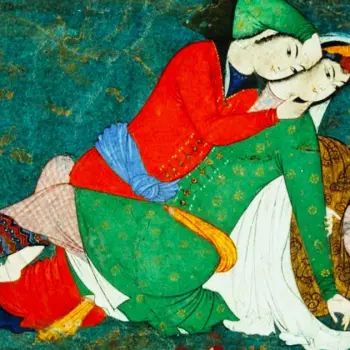The writer of this post wishes to remain anonymous.
Trigger warning: This post contains discussions of body image and disordered eating.
The first Ramadan that I fasted, I was struck by how easy I found it.
This was not exactly a good thing. I had struggled with control issues around food, and with my perception of my body, since I was a pre-teen, long before I was Muslim. When I began fasting, in my early twenties, it quickly became clear to me that the satisfaction that I got from being able to suppress my appetite all day was not only – maybe not even primarily – out of a sense of connection to the Divine. In fact, for the first couple Ramadans, I was too good at fasting; even once the sun set, it was hard to let go of that sense of satisfaction at controlling myself through not eating.
Over the years, I’ve gotten better at finding a balance between enjoying the fast while allowing myself to eat when the sun is down. This year feels different. In the past six months, for a mix of reasons, long-buried body issues have surfaced, and have brought with them some of the most difficult struggles with eating that I’ve ever had in my life. Ramadan in this context is, to be honest, a scary prospect.
Although things have been slightly better over the last two months or so than they were before that, I am scared that spending a month fasting is going to reinforce some of the worst eating (or not-eating) habits that I’ve developed lately. I’m worried about how good it will feel to know that I can make it through the fasting day, 17 hours at a time, without eating or drinking. I’m worried that I won’t be able to eat enough at suhoor or iftar, which have been emotionally stressful since this Ramadan began.
I’m also becoming increasingly concerned about the spiritual side of the month. Over the past few months, I’ve often felt as if I’m living an upside-down life, where I hunger not to feed my body but to deprive it, where I feel more satisfied in abstaining from food than in consuming it. Many days, eating very little is the norm for me. The usual reversal of daily routines that Ramadan brings about is just not the same this time around.
I worry about my current understanding of how I am controlling what I eat. I’m deeply aware that the anxieties around my body, the craving for control through limiting what I eat, and the guilt and stress of eating, lead me away from God. Over the past few months, before Ramadan began, abstaining from food has reinforced thought patterns about how I don’t deserve to eat, because I, or my body, am not “good enough.” I just don’t know if I have it in me to be able to take part in a religious practice that looks so similar to these patterns that damage my spirituality, and get benefit out of the practice instead. I don’t know if I can trust myself to fast “for the sake of God” when I have been effectively fasting for the sake of my own guilt and insecurities so much already this year. I can say the intention out loud, but it feels hollow: would my days really look much different if I weren’t “fasting for God’s sake”? And if not, then what does my intention here really mean? If it’s something I would more or less be doing anyway, then how can I say it’s for anything related to God?
Right now, when I limit or control my eating habits, this brings me away from the idea of God as Sustainer and Provider, who has blessed me with nourishment and sustenance. When I am wary of eating because of my perception of my body, it brings me away from the idea of God as Creator and Shaper, who has created each human in the best of forms. When I feel guilty about eating because I feel like my body is not yet good enough, I am turning away from the concept of God as the One who forgives us even when we don’t think we deserve it, and the only One who is truly perfect.
In other words, fasting – controlling what we eat and when, and emphasising abstaining from food for most of the day – has an uncomfortable number of similarities with practices that are currently hurting me spiritually.
It seems I’m not alone in this, and it’s probably not a surprise that religious practices involving fasting can be widely triggering for those with tendencies towards disordered eating, whether in Muslim or non-Muslim contexts. There is so much to be gained from a month like Ramadan, but I wish it was easier to talk about some of the risks that fasting can bring.
In many ways, a bigger leap of faith for me this year would be to pledge to eat regularly for an entire month: to accept the blessings of food gifted to me by my Sustainer, to honour its role in nourishing my body, whatever it looks like, and to give myself permission to let go of whatever ideals of perfection and control I have been imposing upon myself.
That sounds good in theory, and I think that’s my test this year. I also know that it might be beyond what I am capable of achieving within only a month.
But as I begin this Ramadan, I am trying to gently remind myself that it is not only a month of fasting. It is also a month where the food that we do eat can have immense blessing. Instead of focusing on suppressing my desires, I hope that this Ramadan can move me towards learning to eat with gratitude and awareness.
For more on MMW’s Ramadan series, and to read the rest of this year’s Ramadan posts, click here.
















